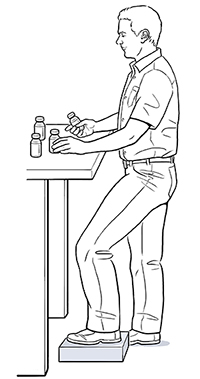A
B
C
D
E
F
G
H
I
J
K
L
M
N
O
P
Q
R
S
T
U
V
W
X
Y
Z
Click a letter to see a list of conditions beginning with that letter.
Click 'Topic Index' to return to the index for the current topic.
Click 'Library Index' to return to the listing of all topics.
Reducing Risk of Musculoskeletal Disorders: Posture at Your Workstation
Having correct posture reduces strain on soft tissues. When you're in a neutral position, your bone structure supports you. A neutral position is a comfortable working posture in which your joints are naturally aligned. It provides a stable base to move from. As a result, your movements carry more power. And your muscles and tendons don't need to work harder just to keep you upright. Working in a neutral position also reduces the localized stress and strain experienced by the muscles, tendons, and joints involved in that particular task. This in turn reduces your risk of developing a musculoskeletal disorder (MSD). To stay close to the neutral position, try the tips below.

-
Assume a relaxed, tension-free posture. Use the right tools and setup for the job.
-
Face your work. If you need to change direction, move your whole body instead of twisting.
-
Position yourself so you don't have to stretch or slouch to reach your materials. You should be able to move your forearms straight out from your body to work.
-
Put a foot up on a ledge or stool to take pressure off your back.
-
Keep frequently used items close to prevent twisting or turning often.
-
Grasp with your whole hand instead of with just your fingers. Don't exert a lot of force while working.
-
Clear away clutter between you and your work.
-
Wait for items on an assembly line to reach you. Don't stretch to meet them.
-
Use task lighting so you don't have to lean over to see your work.
-
Use a magnifying device to protect both your eyes and your posture if you work with small items.
-
Tilt the angle of your work, not your head and neck.
-
Keep your wrists as straight as possible. Don't twist your wrists too far to either side or too far up or down.
-
When seated, keep your feet flat on the floor or support them with a footrest.
Online Medical Reviewer:
Chris Southard RN
Online Medical Reviewer:
Marianne Fraser MSN RN
Online Medical Reviewer:
Vinita Wadhawan Researcher
Date Last Reviewed:
5/1/2024
© 2000-2024 The StayWell Company, LLC. All rights reserved. This information is not intended as a substitute for professional medical care. Always follow your healthcare professional's instructions.